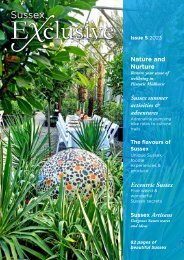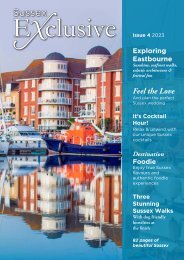Sussex Exclusive Magazine Edition II 2022
Bringing you the best of Sussex, from discovering Sussex vineyards to exploring Lewes and savouring Sussex foodie experiences. In this edition, we meet local artists, learn about Sussex folklore and legends, bring you mouth-watering recipes, mini break ideas, share wellbeing tips and advice, and more. Grab a coffee, put your feet up and please enjoy.
Bringing you the best of Sussex, from discovering Sussex vineyards to exploring Lewes and savouring Sussex foodie experiences. In this edition, we meet local artists, learn about Sussex folklore and legends, bring you mouth-watering recipes, mini break ideas, share wellbeing tips and advice, and more. Grab a coffee, put your feet up and please enjoy.
Create successful ePaper yourself
Turn your PDF publications into a flip-book with our unique Google optimized e-Paper software.
Inheritance<br />
Tax<br />
Agricultural Property Relief<br />
for Vineyards and Wineries<br />
A<br />
great bottle of wine is a<br />
wonderfully simple thing, at least<br />
to the consumer! The issues for<br />
a winemaker or the owner of a<br />
vineyard are however much more<br />
wide ranging.<br />
Let’s focus on Inheritance Tax (“IHT”) which is<br />
ordinarily payable at the rate of 40% on the assets<br />
of an individual who has died, subject to the nil<br />
rate band, currently £325,000, and any reliefs<br />
available, which are discussed below. The reason<br />
for this focus is of course that consideration<br />
of the IHT consequences is an integral part of<br />
succession planning for you and your vineyard or<br />
winery.<br />
HM Revenue and Customs (“HMRC”) have<br />
confirmed Agricultural Property Relief (“APR”)<br />
for IHT purposes has been extended to include<br />
vineyards and wineries. Given the success of the<br />
English wine industry, it is pleasing that the tax<br />
code has caught up with the real world.<br />
But first, what is APR?<br />
In summary, APR is the tax relief given for IHT<br />
purposes on land occupied for the purposes of<br />
agriculture, together with related buildings and<br />
houses used in conjunction with that land. There<br />
are time ownership requirements: two years for<br />
owner occupiers and seven years for tenanted<br />
farmland.<br />
There is then the rate of tax relief: 100% if the<br />
land is in-hand or let on a Farm Business Tenancy<br />
or if vacant possession can be obtained within<br />
two years, and 50% in most other cases. The tax<br />
legislation does not define “agriculture” but it<br />
is normally taken to include horticulture, fruit<br />
growing, rearing of livestock or fish, together<br />
with any woodlands ancillary to the farming<br />
operation.<br />
What is the official guidance?<br />
The guidance from HM Revenue and Customs<br />
confirms horticulture includes “cultivation to<br />
produce food for human and animal consumption”<br />
with the clarification “’food’ in this context would<br />
include, for example, grapes grown to produce wine<br />
and apples grown to produce cider”.<br />
Given the increasing acreage made over to wine<br />
production in South East England, this is to be<br />
much applauded. With <strong>Sussex</strong> and Surrey being<br />
the perfect location to produce outstanding wine,<br />
it is no wonder there are now over one hundred<br />
wineries including a number of well-known<br />
names such as, Ridgeview, Bolney, Wiston,<br />
Tinwood and Rathfinny as well as others with an<br />
international following.<br />
So what does that all mean?<br />
Whilst each of these businesses will benefit from<br />
this clarification when assets are gifted in lifetime,<br />
16 | sussexexclusive.com











